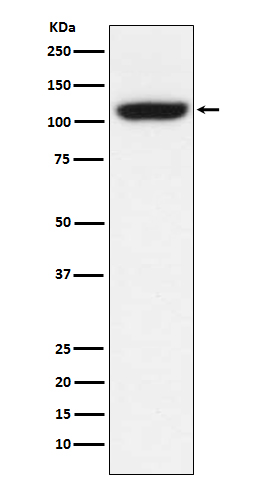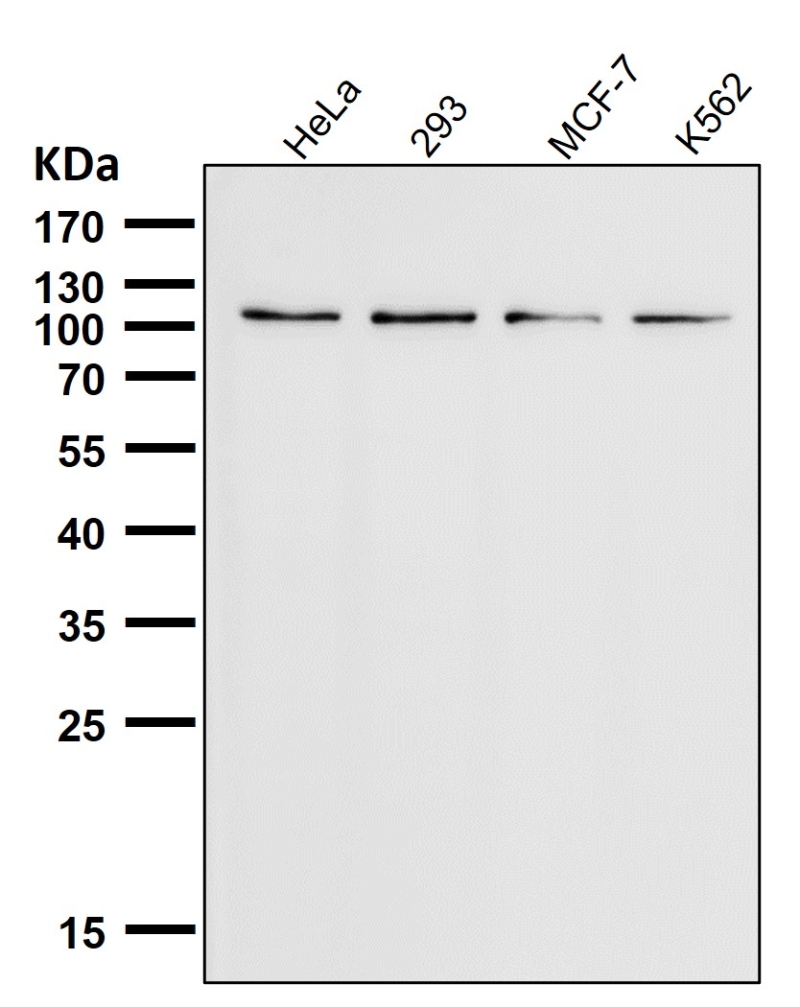

| WB | 咨询技术 | Human,Mouse,Rat |
| IF | 咨询技术 | Human,Mouse,Rat |
| IHC | 咨询技术 | Human,Mouse,Rat |
| ICC | 1/50-1/200 | Human,Mouse,Rat |
| FCM | 咨询技术 | Human,Mouse,Rat |
| Elisa | 咨询技术 | Human,Mouse,Rat |
| Aliases | LTrpC6; MGC2849; Transient receptor potential p8; Trp p8; Trpm8; TRPP8;;TRPM8 |
| WB Predicted band size | 128 kDa |
| Host/Isotype | Rabbit IgG |
| Antibody Type | Primary antibody |
| Storage | Store at 4°C short term. Aliquot and store at -20°C long term. Avoid freeze/thaw cycles. |
| Species Reactivity | Human,Mouse |
| Immunogen | A synthesized peptide derived from human TRPM8 |
| Formulation | Purified antibody in PBS with 0.05% sodium azide,0.05% BSA and 50% glycerol. |
+ +
以下是关于TRPM8抗体的3篇参考文献及其摘要内容:
1. **文献名称**: "TRPM8 is a prostate-specific cation channel highly expressed in human prostate adenocarcinoma"
**作者**: Tsavaler, L., et al.
**摘要**: 该研究首次报道了TRPM8作为前列腺特异性离子通道的高表达,并开发了特异性抗体用于免疫组化分析,发现其在前列腺癌中的表达显著高于正常组织,提示其作为癌症标志物的潜力。
2. **文献名称**: "TRPM8 antibody characterization for cold receptor localization in sensory neurons"
**作者**: Zhang, L., et al.
**摘要**: 研究通过生成兔抗TRPM8多克隆抗体,验证其在背根神经节(DRG)中的特异性,证明TRPM8在冷敏感神经元中的选择性表达,为温度感知机制研究提供了工具。
3. **文献名称**: "Targeting TRPM8 with functional antibodies inhibits prostate cancer growth in vivo"
**作者**: Gkika, D., et al.
**摘要**: 该研究利用人源化TRPM8抗体阻断通道活性,在小鼠模型中显著抑制前列腺肿瘤增殖,表明抗体治疗在TRPM8依赖性癌症中的潜在应用价值。
(文献年份及期刊信息因简化未列出,若需扩展可补充)
TRPM8 (Transient Receptor Potential Melastatin 8) is a calcium-permeable ion channel primarily expressed in sensory neurons and non-neuronal tissues. It functions as a cold sensor, detecting temperatures below 26°C, and is activated by cooling compounds like menthol and icilin. Structurally, TRPM8 consists of six transmembrane domains, forming a tetrameric channel involved in thermoregulation, pain signaling, and cellular responses to cold. Its roles extend to physiological processes such as cold-induced analgesia, bladder function, and hair follicle biology, as well as pathological conditions including cancer progression, chronic pain, and dry eye disease.
TRPM8 antibodies are essential tools for studying the expression, localization, and functional regulation of this channel. They enable the detection of TRPM8 in tissues or cultured cells via techniques like immunohistochemistry, Western blotting, and flow cytometry. Specificity and validation of these antibodies are critical due to structural similarities among TRP channel family members. Recent research highlights TRPM8's therapeutic potential; its antagonists are explored for treating cold allodynia and migraine, while agonists may aid in managing overactive bladder or obesity. Antibodies targeting TRPM8 also support drug development by verifying target engagement or modulating channel activity in disease models. However, challenges remain in understanding tissue-specific isoforms and post-translational modifications affecting antibody binding. Ongoing studies aim to refine antibody specificity and expand applications in both basic research and clinical diagnostics.
×